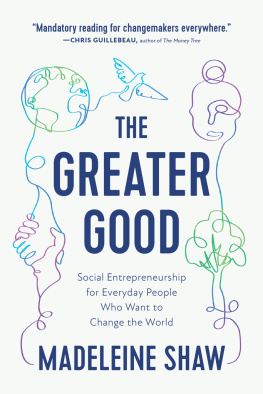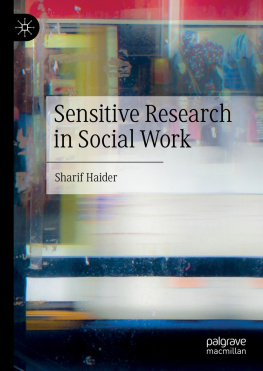First published in Great Britain in 2018 by
Policy Press University of Bristol 1-9 Old Park Hill Bristol BS2 8BB UK Tel +44 (0)117 954 5940 e-mail
North American office: Policy Press c/o The University of Chicago Press 1427 East 60th Street Chicago, IL 60637, USA t: +1 773 702 7700 f: +1 773-702-9756 e:
Policy Press 2018
British Library Cataloguing in Publication Data
A catalogue record for this book is available from the British Library
Library of Congress Cataloging-in-Publication Data
A catalog record for this book has been requested
ISBN 978-1-4473-3889-5 hardcover
ISBN 978-1-4473-3892-5 ePub
ISBN 978-1-4473-3893-2 Mobi
ISBN 978-1-4473-3891-8 epdf
The right of Ian Shaw to be identified as author of this work has been asserted by him in accordance with the Copyright, Designs and Patents Act 1988.
All rights reserved: no part of this publication may be reproduced, stored in a retrieval system, or transmitted in any form or by any means, electronic, mechanical, photocopying, recording, or otherwise without the prior permission of Policy Press.
The statements and opinions contained within this publication are solely those of the author and not of the University of Bristol or Policy Press. The University of Bristol and Policy Press disclaim responsibility for any injury to persons or property resulting from any material published in this publication.
Policy Press works to counter discrimination on grounds of gender, race, disability, age and sexuality.
Cover design by Policy Press
Front cover image: istock
Readers Guide
This book has been optimised for PDA.
Tables may have been presented to accommodate this devices limitations.
Image presentation is limited by this devices limitations.
Research in social work
Series editors:
Ian Shaw, National University of Singapore, Singapore and John Gal, Hebrew University of Jerusalem, Israel
The Research in Social Work series, published with the European Social Work Research Association, examines current, progressive and innovative research on social work in Europe. A leading collection for social work academics, researchers and practitioners, it makes a unique contribution to this international field.
The series editors invite proposals for books drawing on original and cutting-edge research and which aim to influence social work academia and practice. They can be contacted through either the office of the European Social Work ().
Forthcoming titles in the series:
Jobling, H. (2019) Power and control in social work: An ethnographic account of mental health practice
Devlieghere, J. (2019) Digital technologies and social work: Opportunities and illusions
Klammer, U., Leiber, S. and Leitner, S. (2019) Social work and the making of social policy
Nygren, L., Oltedal, S. and White, S. (2019) International social work with families: Comparing contexts and complexities in Europe, Latin America and Australia
Introduction
The purpose of this book is to provide social work students at different levels and in different countries with a detailed sketch of how research finds a place in the wider social work picture. While authors (too) often claim a distinctiveness for their writing, I am here aiming to deal with questions that in their detail and also their relation to one another are rarely covered in the social work literature.
I have endeavoured to provide an accessible entry point for thinking hard about social work in general and research in particular. In other parts of my writing I have tried to work through these issues to more scholarly audiences, but here I write for students and practitioners. As much of the book draws on presentations to just such audiences, the level and tone of the book will, I hope, be ensured. My aim is to engage social work students in questions and issues in a form that will make for a professional community that is thoughtful, critical and committed, yet also I dare to say modest.
I have tried to make clear what this book does not set out to provide. It is not a research methods book at any level. Nor is it solely about research, but rather about research as part of a larger picture. I anticipate that one feature of the book that will quickly be noticed is the number of quotations from interviews with scientists in what we generally regard as the mainstream sciences. This is quite intentional, and reflects the conviction that social work has too easily fenced itself off from other disciplines.
I do not claim to be innovative in these pages. Almost all of the issues tackled are those that I have endeavoured to think and write about over the past decade. But rather than attempt to re-lay scholarly foundations, my concern in these pages is to try something equally demanding and communicate in an accessible and stimulating way the superstructures of practice supported by such foundations.
The approach and layout of the book are rather different from most texts. It may help to say that throughout I move between accessible ways of thinking hard and opportunities and exercises that progressively support the reader in making sense of the material in their day-to-day course programmes, practice placements and research. I have done this in two ways by the inclusion of short-task boxes and by the presence, where appropriate, of closing sections on making practical sense of the chapter material. I also have included some boxed material where it seems useful to spell out some examples in more concrete detail.
The short-task boxes are embedded, woven into the chapters. This is one of the more innovative features of the book. The reason for doing so is to facilitate reflection and development in the here and now as the book is read. Rather than read through a whole chapter, the intention is for readers to pause mid-current and bring their own thoughts and experience to bear. Sometimes this will involve moving away from the book. For example, the very first such box presents a task about the much-used but not well thought-through idea that good research and science may depend on serendipity. Task Box 1.1 suggests: Readers undertaking dissertation or thesis work or early career research might ask a senior research figure whose work they respect if s/he puts any of their success down to serendipity. Tasks such as this may be undertaken as solo mini-projects or as part of a group activity or seminar. Often they can be undertaken at different levels.
While some of these tasks encourage associated reading (Task Box 2.1, for instance, urges the value of actually reading Thomas Kuhns ground-breaking book The structure of scientific revolutions), I have resisted the familiar practice of including further reading for each chapter. This is partly because I confess from experience that I rarely, if ever, pursue such well-intended advice, and partly because the end references give enough scope for interested readers to see where I am coming from and where they may choose to go.


















